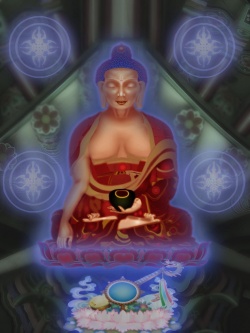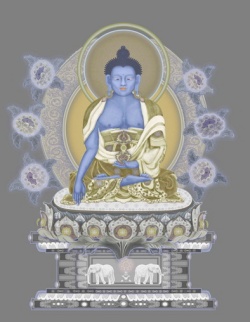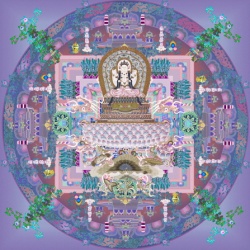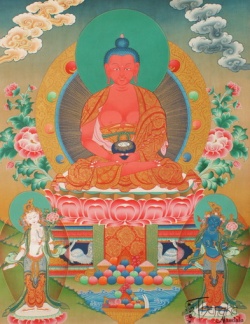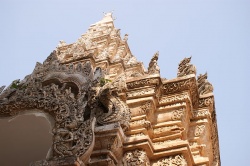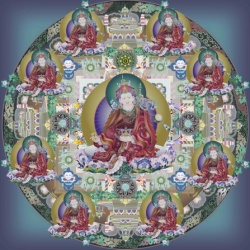Cognitive Scepticism Of Nagarjuna
aulib@dte.vsnl.net.in
- ABSTRACT: This paper aims at a critical exposition of some arguments by Nagarjuna against the cognitivist claims of the Nyaya philosophers, and a possible cognitivist critique of the skeptical arguments of Nagarjuna. My argument is presented in two broad sections. The first deals mainly with an exposition of Nagarjuna's charges against the concept of pramana, while the second is devoted to critical evaluation of the Nagarjunian charges.
I conclude with the impression that there is hardly any common ground on which a Nyaya cognitivist and a Nagarjunian skeptic can meet. For this reason, the Nagarjunian cognitive skepticism seems to be theoretically 'irrefutable' but 'psychologically incorrigible.'
Preamble
By cognitive scepticism here we mean a philosophical attitude which suspends the possibility of making conclusive statements concerning non-erring cognition or prama as it is called in Indian Philosophy for want of sufficiently warranted instrumental and casual grounds (or pramanas as it is called in Indian Philosophy).
A cognitive sceptic, dose not go for 'theory - making'. Amidst the opposing claims he finds no better ground for his choice for one claim than its contra-claim. In philosophical circle, he questions or raises doubt about the validity of the 'knowledge claims' made by others.
If we bear in mind this general characterization when we read Nagarjuna's philosophical treatises like Vigraha-vyavartani and Mulamadhyamaka Karika, we would be convinced that there is no logical or psychological obstruction or hardship to make an extension of the applicability of the term 'cognitive sceptic' to Nagarjuna.
In his philosophical works Nagarjuna subjects the 'knowledge-claims' made by the Naiyayikas and others to severe dialectical criticism and shows that these claims are not supported by sufficient justification.
The philosophical opponent of the sceptic to coin a word from Matilal, may be called 'cognitivists'. (2) In Indian Philosophy they are mostly Naiyayikas who claim that with the help of justificatory grounds as casual instruments (pramanas) we can have the cognition of the objects of the knowledge (prameyas).
In Akaspada Goutama's 'Nyayasutra' knowledge is considered as something that leads to attainment of the highest good ( tattvajnanannihsreyasadhigamah ).
In Nyaya system of philosophy knowledge is taken as something which always points beyond itself. All the furniture of the world are classified under several sets of objects of knowledge ( prameyas ).
A piece of cognition is valid if it can give us an indubitably true awareness of an object of knowledge. Nagarjuna devoted 20 verses from 31st 51st in Vigrahavyavartani in order to refute the Nyaya concept of pramana.
Nagarjuna's main concern here is not to say that what we know about the world is false; rather he maintains that the knowledge claims made by the cognitivists ( Naiyayikas and others ) are not supported by adequate logical grounds.
The paper is divided into two broad sections .
The first section deals mainly with the exposition of Nagarjunian charges against the concept pramana while the second is devoted to critical evaluation of the Nagarjunian charges. The paper ends with some general remarks.
The main contention of Nagarjunian scepticism is to set a limit to cognitive claim of the Naiyayikas.
In other words, it is rather a critique to the soteriological claims on the basis of empirical foundation of cognitivists' theory of knowledge.
It is a scepticism about the justification of knowing or pramana.
1 : No Criterion Argument
The pramanavadins (cognitivists) claim that it is possible to have indubitablely true presentational cognition or (prama) on the basis of pramanas.
A pramana is usually defined as the instrumental cause of an indubitable and unerring piece of presentational knowledge.
All cognitivists in Indian Philosophy would agree that the acceptance of pramanas is something exclusively indispensable for any philosophical investigation, because if some 'rules of game' (as Wittgenstien in his 'Philosophical Investigations ' compares a philosophical enquiry as a form of linguistic game) are not accepted at the very outset a player would not be entitled to take a part in the game. In other words, he would be putting himself out of the court before the game begins.
(3) A Nyaya cognitivist Vatsyayana further argues that in philosophical debate, one is supposed to defend or reject certain thesis.
Even for the rejection one would require this or that pramana.
In other words, even the very denial of a certain pramana is possible only on the acceptance of certain other pramana and this precisely establishes the validity of pramana as such.
And if once it is admitted that the validity of pramana as a variety of knowable (prakara), one is logically compelled to recognise three other varities of knowables (prakara)-the agent of knowledge (pramata), object of knowledge (prameya) and knowledge par excellence (pramiti). (4) It is here a Nagarjunian philosopher would object that your very programme is defective.
(5) If you say that prameyas or knowables are justified because of pramanas (ground) and pramanas are not questionable, then you are acting as a dogmatic in philosophising.
If you accept the reality of pramanas without any justification, your very acceptance is an exercise of dogmatism.
All the accounts of the cognitivists may be broadly classified under two heads:
(a) the pramanas are self-validating (svatah prasiddhih) that is to say they are intrinsically valid.
(b) their validity is established on the basis of some other pramanas (paratah prasiddhih).
Both these possible alternatives have been examined by Nagarjuna.
The charge of no criterion centres the question: How is a congitivist going to validate his standard or criterion (pramana) itself ?
It is said that pramana is valid on its own ground in terms of itself, that is no more than just begging the question and is a case of dogmatic enterprise.
If it is said that pramana is validated in terms of another, that would immediately leave room for the charge of infinite regress.
Now either way, according to a Nagarjunian sceptic, a cognitivist can not have adequate means to support the established status or truth-criterionship of pramanas which lies at the foundation of cognitivist's truth-claims. Let us elaborate the arguments.
1.1 Charge of Inner-inconsistency and Dogmatism Explained
The point Nagarjuna elaborates is this that dogmatism and inconsistency of arguments would be automatic outcome if we admit pramanas as self-validating.
Nagarjuna further argues that if we admit that pramanas are required for the justificatory grounds as well as intrumental cause for establishing the knowables (prameyas) but the pramanas themselves belong to a self-validating class, then we also accept that pramanas are placed in a 'privilezed sacrosanct class'-that is to say, a clear-cut dichotomy is introduced between pramanas and prameyas.
But a philosopher must explain, the justificatory grounds for such preferential treatment; he should not merely state the dichotomy but must explain the reason behind such dichotomy.
This is what exactly Nagarjuna demands. 'If without assigning any reason pramanas are claimed to be self-validating then a sense of arbitrariness would be introduced and this acceptance of this without any justificatory certification is a clear case of dogmatic enterprise.'
This is also a case of internal inconsistency and disaccord in congnitivists' arguments.
1.2 The Charge of Infinite Regress Revisited
Now if in order to aviod the charge of non-accordance and dogmatism, the cognitivist adopts the second alternative that is a pramana may derive its validity or authority from another pramana of the same type or different type this would, according to Nagarjuna, instead of giving any justification for the acceptance of pramana simply invite the blemish of infinite regress (anavasthadosa).
(6) For example, of the first alternative we may say that a perception say P1 is established through another perception say P2 and for the second, a perception say P, is established through an inference say F.
But in either case of the theory of extrinsic validity, the blemish of 'infinite regress' would be inevitable.
(7) These are the techniques about which the congnitivists themselves highly speak of, that is, if something is to be acceptable, there must be inner logical consistency between the justification and the claim and a justification must not be vitiated by the blemishes of circularity and infinite regress.
The sceptic here is just reminding the cognitivists that claiming pramanas as self certified, you are committing logical inconsistency and claiming them as established by others you are either inviting the blemish of circularity or the blemish of infinite regress.
1.3 Analogical Arguments Refuted
However, Goutama in the Nyayasutra also employs the analogy of a lamp (pradipa) to meet possible charge of infinite regress. (8) He says that as a lamp reveals objects as well as itself, so the pramana (supportive grounds) reveal prameyas (knowables) as well as themselves.
It is here Nagarjuna tries to point out faults and in 'Vigrahavyavartani' he devotes six verses in order to show that the analogy of light or fire is quite incapable of serving as a 'sapaksa' in the cognitivists' arguments.
(9) In 'Vigrahavyavartani' verse 35, Nagarjuna argues that if pramanas were like light or fire which reveals itself as well as the presence of other subjects simultaneously then there would be no logical as well as practical difficulty in claiming that fire would also burn itself as it can burn other things.
(10) But this is a contradiction in thinking as well as in the actual happenings. In view of this, the cognitivists' assumption that fire reveals itself as well as other objects' becomes doubtful and remains unestablished.
It is further contended that if 'fire reveals itself as well as other object is true, then the proposition that 'darkness conceals the existence of itself as well as other things' would also be true.
(11) It is an admitted fact that although darkness conceals the presence of other things, it does not conceals the presence of itself.
(Na caitad drstam tatra yaduktam / Svaparatmanau prakasayatyagnirititanna).
(12) What is evident here is that in contrast with the cognitivists 'light analogy, Nagarjuna constructs just contrary analogical argument to disprove the cognitivists' claim.
1.4 Blemishes of Interdependence and Circularity Detected
Nagarjuna further argues that if for the sake of argument we admit that pramanas are self-established, then it would imply that they are established even independent of prameyas (knowables). (13) But if a kind of pramana were established without reference to prameyas, then this particular type of pramana ceases to be worthy of the name pramana.
If it is argued that pramanas are independent of prameyas, then these pramanas become pramanas of nothing. As pramana has always a relational character with prameya in cognitive situation, the thesis that 'pramanas are independently established' becomes refuted.
If it is said that pramanas are established through prameyas and prameyas through pramanas, then a Nagarjunian sceptic would at once point out that neither of them have a self-nature (svabhava) of their own and therefore, should be treated as sunya (vacous).
(14) Again, it would be a case of proving what is already proved (siddha-sadhana), because the tacit assumption is this, that prameyas are already established.
(15) If prameyas were regarded as already established, the necessity of pramana itself for the establishment of prameyas becomes superfluous.
If it is said that the validity of pramanas are prameyas dependent and the validity or establishment of prameya is pramana dependent then it amounts to committing the blemishes of interdependence and circularity.
Nagarjuna laughs at the cognitivis because his view almost amounts to say that "the son is produced by the father and that father is produced by that son.
But in this case who is that gives birth and who is that is born".
(16) Therefore the criterion of mutual dependence rather shows that both pramanas and prameyas are devoid of any essence of their own (sunya).
Since there is neither established pramana nor established prameya the so called 'knowledge-claim' of the cognitivists becomes unwarranted.
(17) All views (drsti) about the world, for Nagarjuna, becomes systematically misleading and therefore, they are to be rejected.
2 : A Cognitivist Critique of the Nagarjunian Critique of Pramana Considered
It has been seen that a cognitivist claims that it is possible on our part to know something with certitude and we can justify our claims by adequate supportive grounds.
A Nagarjunian sceptic only gives caution to these and shows flaws of antinomies in cognitivists' reasonings. Let us now see how far the sceptical charges be answered from the cognitivistic viewpoint.
Vatsyayana would meet the sceptical charge of infinite regress by saying that it is not necessary that before functioning as an instrument a thing must be known first.
For example, we become visually aware of something in front of us by our eyes, the sense of sight but we cannot see the senses itself. We do not question or doubt about the reality of eyes.
This shows that in practical experience, the establishement of pramana does not arise and there is no scope for infinite regress, because their truth can be apprehended directly or immediately .
A piece of cognition is said to be valid if practice based on the assumption of its truth leads to the attainment of desired end.
What Udayana puts with regard to infinite doubt in another context seems to be relevant here. He is of opinion that "infinite series of doubt in principle is not possible.
It could never be carried out, since the activity of doubting is possible only against the background of some area of certainty."
(18) Vatsyayana further contends that there is no rigid distinction between prameya and pramana both of these have the same source - the root 'ma' (means 'to measure') and both of them are meaningful only in certain cognive contexts.
If we try to understand the significance of different 'case-inflections' in sanskrit language, it would be clear that these karakas stand for 'different role-playing' in the linguistic contruction.
(19) When something is called a pramana, we mean that it has the instrumental role in generating cognition and in case of prameya, it has the role of accusative case in a cognitive situation.
With this background we think a Nyaya cognitivist may say that when something is playing the role of a pramana, psychologically we do not feel the necessity for pramana's validity or establishment.
But here, I think, a Nagarjunian sceptic may argue against the cognitivists' pursuation by saying that he does not see any good ground for introducing psychological proof when one is engaged in purely logical debate. Psychological proof can not be taken to be an adequate gurantee for objective truth-claims.
And it is also true that a cognitive sceptic's suspension of judgement regarding what is real as mental act need not distrub his private life.
He only exercises his reasoned suspension of judgement about reality when there is a suitable occasion for it.
The Naiyayika cognitivist may level another fresh charge aginst Nagarjunan sceptic by saying that it is impossible to carry out the infinite doubt regarding the validity of pramanas, because when one denies a thesis say P, as defective, he must have a thesis, it might be a counter-thesis, say 'not-P', that is not defective.
Without involving oneself in theoretical inconsistency, one can not deny the validity of pramanas as such.
Uddyotkara in the 'Nyaya-vartika' carried this charge in a much more straightforward way and brings the charge of self-stultification against a cognitive sceptic. (20) The charge is this : If you deny everything, then you can not deny the fact that 'you are denying'. If you do not deny the fact that 'you are denying' then you are not denying everything.
What seems to me convincing here is that a cognitive sceptic like Nagarjuna would not mind for these charges.
A close study of Nagarjuna's arguments would reveal that he would be pleasant in seeing that by this charge, the cognitivist misunderstands him again and are trying to grasp what the sceptic intends to convey.
That is to say, what cannot be stated, one must not state it or advocate a theory about it. It is another significant aspect of Buddha's mysterious silence regarding metaphysical issues, the Madhyamika unfolds.
In defence of Nagarjuna, one might argue that by sceptical arguments Nagarjuna examines all the possible views about the establishment of pramanas and finds that to any 'pro-argument' for a doctrine, there can be 'contra-argument' and thus he dose not have any other choice but to stop advancing another thesis regarding prama, prameya and pramana.
He has engaged himself in epistemological debate because it is on the basis of such epistemology, different metaphysical theories can come into being.
A cognitivist like Goutama, considers valid cognition of reals (tattva) as that which leads to the highest good (nihsreyasah).
Nagarjunian scepticism may be considered as a caution that points to the inadequacy of such soteriological claim on the basis of their epistemological stand.
As regards the cognitivists' charge of self-stultification, a cognitive sceptic like Nagarjuna would react that this comes out from a misunderstanding of the exact significance of his refutation.
It is to use a term from classical Indian epistemology, a 'prasajya pratisedhah', that is to say, a rejection of the possibility without (even a least) implificatory significance to assert another or counter possibility.
It is different from 'paryyudasapratisedhah'. In paryyudasa-pratisedhah' the assertion of the counter thesis motivates the very act of rejection of any thesis.
(21) This consideration is enough to show that the cognitivists' charge of theoretical incoherence in sceptcial rejection is not tenable.
From this it appears that theoretically scepticism is irrefutable. A cognitive
sceptic like Nagarjuna would only try to unfold the drama of the logical consequences of the cognitivists' epistemological framework.
To be more specific, Nagarjuna tries to undermine the foundations of speculative metaphysics.
The language Nagarjuna uses is 'meta-language' and by this type of linguistic expression about statements that make 'objective truth-claims', he can answer the charge of self-stultification against him.
As a result when all statements of 'object-level' are shown to be unwarranted, that does not affect the truth-status of the meta-level statement of Nagarjuna.
The remedy suggested by Nagarjuna is the awareness of 'sunyata', the rejection of language empirical determinations as an adequate instrument for any veridical description of the real.
Nagarjuna's dialectics merely "shows" the structure of reality but does not "say" or "assert" anything about reality.
Had he been aquainted in the linguistic phrasology of Wittgenstein, he might probably have expresed it in the same vein "whereof one can not speak, thereof one must be silent.' (22)
3. Concluding Remarks
From what has been discussed in fore-going paragraphs, a crucial question may be raised at this point. How can such a (logically irrefutable) sceptical position be consistently carried out in practice ? Can it make 'adequate sense' in 'belief-behaviour'. Does it (the sceptical position) not overthrow the foundation of all practical activity ?
Can we live without the guidance of some inherent position what we accept ?
A cognitive sceptic of Nagarjunian type might react to such questions by saying that it would be an exercise of dogmatism if something with reference to actual state of practics is introduced as the ultimate resort when somebody is engaged in purely theoretical discourse with his philosophical opponents. (23)
It is however, true that a Nyaya cognitivgist's pre-suppositions for pluralistic metaphysics and its description through epistemological frame-work seem to initiate the sceptical approach in Indian Philosophy in order to dismantle the main fabric of many dogmatic assertions.
An important question may arise here : Can there be any commonly sharable point on which a Nyaya cognitivist and a Nagarjunian sceptic can meet ?
Our humble answer to this question would be in the negative.
When a Nagarjunian sceptic is asking for the pramana's pramana he is demanding for the absolute causal proof as the ground for claiming truth (in the absolute sense) regarding the object of knowledge.
A cognitive sceptic uses the term 'indubitability' strictly in the logical sense 'which imputs the intrinsic doubtfulness of all contingent statements.' (24) He criticises the concepts required to justify any knowledge-claim.
But a Nyaya cognitivist does not make cognitive claim in its absolutistic sense; he would rather say that he seeks pramana whenever he feels necessity for this in actual state of practice.
For him, it is somehow 'nonsensical' to seek reason after reason, that is, to go on seeking where there is no 'psychological requirement' for this in actual state of practice.
Again, for a Nyaya cognitivist, the concepts like pramana (causal means of knowing), prameya (knowable) etc. are not absolute but relative to the context of their specific 'role playing'.
(25) A pramana is considered as the causal and instrumental ground for yielding knowledge (prama) which is of the nature of an effect, in certain context about a certain knowable (prameya); it does not mean that in certain other contexts it can not act as a knowable (prameya).
In view of this Nagarjuna's demand for explaining the cause of placing pramana in a 'sacrosanct class' seems; to be unwarranted.
The same term seems to be used by the cognitivist and the sceptic in two different senses; the former uses it in the 'relative sense' whereas the later uses it in the 'absolute sense.
For a Nyaya cognitivist, all logical queries are to be preceded by some psychological factors like 'dubiousness' about the exact character of the knowable and this state of doubt is to be eradicated by the application of a pramana (s) that can causally justify the truth of a specific cognitive episode as devoid of doubt.
And an evidential justification in the sense of causal ways and means of knowing is considered as 'justification' as long as it is coherent with the practicability.
But a Nagarjunian sceptic whose sole interest lies in 'refutation exclusively' does not care for this and devotes so much to clear the way to travel that he almost forgets the destination.
Facing the difficulty in meeting the psychological ground for the endless logical enquiry, a Nagarjunian sceptic and the Nyaya cognitivist use 'reason' in different senses;
for the former, it is 'pure theoretical reason' ; for the latter it is 'practice-oriented' reason that springs from 'our form of life'
(26) It also appears that Nagarjuna's sceptical approach is an attempt to show the limitation of the applicability of 'practice -oriented' reason to assert the nature of reality with absolute certitude.
Though a sceptic like Nagarjuna may say that in 'theoretically oriented' debate it is irrelevant to introduce the element of pragmatic efficacy; a Nyaya cognitivist may remind his sceptic friend here that without accepting the validity of some common principles even no 'theoretically oriented' debate can begin at all.
But in turn, a Nagarjunian sceptic would say that he is ready to accept the validity of the so-called principles only as an 'adhoc' arrangement which is to be rejected ultimately.
But since there seems to be no commonly sharable platform for both a cognitive sceptic and a Nyaya cognitivist, does it suggest that the sceptic does leave the arena of knowledge empty handed?
Our answer to this, would be in the negative. In fact, Nagarjuna's sceptical charges in Indian philosophy directly or indirectly;
I believe, have been cautions to the tendency of 'closed-door thinking' on the part of some cognitivist and placed them on the alert. Aksapada Goutama claims knowledge as that which leads to the attainment of the highest good (nihsreyasah).
Nagarjuna's sceptical arguments egarly point out that such soteriological assertions on the basis of empirical foundation of epistomological 'superstructure' are unwarrented.
As a result of this probably in latter commentaries and subcommentaries on Nyaya philosophy we see that meticulous care have been taken to re-structure the definition of prama, pramana etc.
(27) Opening the way of 'free enquiry' and shaking the ground for dogmatic faith cognitive scepticism of Nagarjuna type has directly or indirectly given momentum to clear 'hindrance to genuine' cognition.
(28) The force of sceptical arguments makes many Indian philosophers purturbed as to whether it is possible to speak of truth and knowledge with emprical foundation. This seems to be a great disservice to the later development of epistemological subtleties in Indian Philosophy. 29
Notes
(1) Scepticism is, indeed a wide term which may mean two board types of epistemogical attitude.
In the wider sense it would mean an epistemological attitude that suspends all calaims for the possibility of knowledge and in this sense a sceptic carries doubt and "seeks nothing beyond uncertainty".
But there is a special type of epistmological attitude/grounds through which we can dispute the validity of so-called "knowledge-claim" in all its aspects.
The word "knowledge has been used throughout this paper in order to mean (what is called prama in sanskrit in Indian epistomology) true and sure piece of presentational cognition and 'knowledge' in this sense is always known by certain causual ways and means of knowing (usually called in sanskrit pramana).
(2) Philosophers who claim the possibility of knowledge (pramana) on the basis of one or some casual instruments of knowing (pramana) are called pramanavadins, the nearest word for which in western philosophy may be 'cognitivists'.
All cognitivists agree that whatever be the case of a knowable, it must be yielded by certain pramanas.
But Indian philosophical heritage is also gifted with some philosophers who do not admit the reality of pramana itself and consequently question all claims in favour of the possibility of knowledge on the basis of pramana.
Nagarjuna, Jayarasi and Sriharsa are three important philosophers who do not accept the validity of any pramana and if the reality of pramana itself is questioned or refuted the claim to possibility of knowledge stands rufuted. For details see. B. K. Matilal, Perception (Clarendon Press, Oxford, 1986) P. 64.
(3) Ludig Wittgenstein, Philosophical Investigations (Trans. GEM Asncombe, Oxford Blackwell 1958 Sect. 65) P. 31
(4) Vatsyayana in his commentary on Goutama's Nyaya-sutra 1.1.1. thus says, "pramananata' rthapratipattu pravrttisamarthyadorthavatpramanam ..... Arthavati ca pramane pramataprameyampramitityarthavanti bhavanti ...... Catusrsucaivabvidhasu tattvamparisamapyate". It is to be noted here that all these four naming as pramana, premeya etc. are due to the particular 'prakara'. In other wards, something is a pramana in a particular unit of knowledge and it may play the role of prameya in some other unit of knowledge.
But the Nagarjunian sceptic accepts pramana as something in the rigid sense of its function, that is to say always it acts as causal ways and means of knowing irrespective of variation in contexts of use.
(5) It is to be noted in this connection that in Indian philosophical heritage from early days various knowledge claims were made regarding ethical and religious matters.
There were also thinkers like Sanjaya who questioned vehemently about the metaphysical assertions or claims.
To meet such challenges in different phases of time various cognitivistic account or pramana theories have come into existance. Gradually the very tradition of questioning the truth-claims with regard to metaphysical and moral matters led to the development of sceptical arguments against the possibility of any 'knowledge-claim'.
The Nyaya cognitivistis on the otherhand, developed a cognitivistic attitude and claimed that 'what is existent is knowable, even nameable'
But in order to know it, the existance of a pramana or various pramanas must be a priorily admitted.
They may be compared with axioms for a logical system and their validity is not questionable within this cognitivistic system. For details about Sanjayas method of philosophy, one may see my paper titled; Amaraviksepavada;
The Philosophical Method of Sanjaya, Silchar, Journal of Assam University vol. 4, no 1, 1999.
(6) The sanskrit word 'anavastha' literally means 'lack of a firm foundation. Nagarjuna brings this charge against paratah / paraparatah pramanyavada in the following words :
"Anyair yadi pramanaih pramana sidhir bhavettadanavastha / Nadeh siddhitatrasti naiva madhyasyanantasya /-Vigrahavyavartani" (hence forth VV) No. 32.
(7) Nagarjuna notes all these possible instances in his vrtti (verse 51)
(8) It is interesting to note in the passing that Jayantabhatta in Nyayamanjari likeother cognitivists also holds that knowledge (prama) is a piece of true and indubitable awareness. But the concept of indubitability has both psychological and logical senses of use.
For the Nyaya, the psychological sense of use is satisfied by the element of 'pragmatic success' (arthakriyakaritva) and the logical sense of use is satisfied by introducing the casual justificatory grounds (pramanas).
In the first sense the term; 'indubitable' is taken to mean that one is subjectively convinced that 'p' whereas in the second sense it imputs to contingent propositions', 'inherent dubitableness'.
A Nagarjunian sceptic seems to capitalise mostly on the second sense and thus brings the charge of infinite regress. Vatsyayana, however tries to meet the sceptical challenge of infinite regress to psychological pursuation.
He argues that when we prove A by B and B by C, it dose not invite the blemish of infinite regress, because at certain level, say at C, the further question of validity (regarding C) becomes irrelevant. Where there is no query, there can not be any necessity of searching for a further justificatory ground.
(9) Sapaksa : Niscitasadhyavana paksena saha vartamanah sapaksa -yathaparvate dhumena vanhi sadhane mahanasah' - Nyayakosah Ed. By M. M. Bhimacharya Jhalakikar, revised by M. M. Vasudeva Sastri Abhankar, (Oriental Institute, Puna, 1929) P. 952.
(10) Yadi ca svaparatmanau tvadvavanena prakasyatyagnih / paramiva nanvatmanam svam paridhakasyatyapi hutasah // vv. No. 35.
(11) Yadi ca svaparatmanau tvadvavanena prakasyatyagnih / pracchadayisyati tamah svaparatmanau hutasaiva // vv. No. 36.
(12) Pradipah svaparatmanau samorkasyayate yad / tomo' pi svaparatmanau chadayisyatyasamsayam // Maddhyamika - karika-Ch.vii 12; also see in the commentry on Vigrahavyavartani verse No. 36.
(13) Anapeksya hi prameyanarthan yadi te pramanasidhiriti / nabhavanti kasyacidevamimanitanipramanam // v. v. No. 41
(14) Madhyamika-karika : 1.5 (Ed. P. L. Vaidya, Mithila Institute, Darbhanga 1960)
(15) Atha tu pramansiddhirbhavatyapekasyaiva te prameyani / Vyatyaya evam sati te dhruvam pramana prameyanam te pramanasiddhya premeya siddhih prameya siddhyaca / bhavati pramana siddhirnastyu bhayasyapi te siddhih// v. v. verse 45-6
(16) Pitra yadyutpadyah putriyadi tenaciva putrena / Utpadyah sa yadi pita vada tatrotpadyati kah kam ? Kasca pita kah putrastara tvam bruhi tavubhayapi ca/ Pitrputralaksanadharau yato bhavati no samdehah // v. v. verses 49-50
(17) Naiva svatah prasiddhirna parasparatah parapramanar va / Na bhavati na-ca prameyairna capyakasmat pramananam II v. v. No 51. Comparable :Na svatah na paratah no dvabhuyam napyahetutah / Utpannajatu vidyante bhavah kvacana kecan // Madhyamika karika 1. 1.
(18) Drstyadrstorna sandeho bhavabhava viniccayat / Adrstivadhine heto pratyakasamapi durlabam Nyayakusumanjali Ch. 3, Verse 6, (Ed. P. Updhyaya & D. Shastri, Varanasi, Chowkhamba, 1957).
(19) See : Vatsyayana's commentary on Nyaya-sutra-2. 1.9. (Na pradipa prakasa siddhivat tat siddheh) By the sanskrit word 'na' the Naiyayika refutes the possibility of sceptical charge and then the compares the casual means (pramana) with light.
Though light is exclusively required for the illumination of other objects, light itself is sufficient for illumination.
According to Vatsyayana the sceptical arguments shows that pramanas can not be accepted as proof for prameyas unless we admit pramanas as either apriori or simultaneous to prameyas and on examination none of the alternatives can be accepted.
But this charge is not directly mentioned in Vigrahavyavartani nor does Vatsyayana mention any name as the propounder of this objection. However, we may subsume it under 'Visesahetusca vaktavyam'.
(20) Nyaya-vartika- 2.1.12. (Ed. V. P. Dvibedin, Varanasi, Chowkhamba, 1915) P. 189.
(21) Prasajya pratisedhah is similar to J. R. Searle's illocautionary nagation which is meant to negate 'illocutionary force' (See, Speech Acts : An Essay in the Philosophy of Language, Cambridge, Cambridge University Press, 1969, PP 32-3) Sabdakalpadruma (Vol. 3, Chowkhamba Sanskrit Series, 1967, P. 298 & 264 explanation goes thus : Apradhanyam vidheryatra pratisedhe pradhanata / prasajya pratisedho 'savkriyaya saha yatra nan // Pradhanyam hi vidheryatra pratisedhe' pradhanata / paryyudasa sa vijneyo yatrottarapadena nan //.
(22) L. Wittgenstein : Tractatus-Logico-Philosophicus ( Kegal Paul, London, 1947) P. 189.
(23) According to J. W. N. Watkins, the pragmatic consideration or difficulty cannot be an adequate rebuttal for a sceptic engaged in cognitively (theoritically oriented) questioning. Question of 'praxis orientation' is also irrelevant here, because it is noncognitive. For details see : Science and Scepticism (Hutchinson, London, 1984) P. 36. One may also see in this context : R. N. Ozick : Philosophical Explanations (Oxford University Press, Oxford, 1981) P. 197
(24) Quinton distinguishes five uses of 'indubitableness' in philosophical enterprise. See : A. M. Quintion : The Nature of Things (London, 1975) PP. 144-9
(25) See : Vatsyayana's commentary on 'Nyaya-Sutra 2.1.19
(26) See : T. K. Sarkar : Knowledge, Truth and Justification (Calcutta, Allied Pub. & Jadavpur University, 1992) P. 203
(27) It is to be noted here that we see some refinement in using philosophical concepts in the later writing of the same Nyaya School.
When in the Navyanyaya (Neo-school of Nyaya) the term knowledge (prama) is prefixed by the term asandigdha (non-dubious) it does not mean 'knowledge must be certain', rather it implies that a genuine piece of knowledge (prama) will never be vitiated by the presence of 'dubiety' about the absence of knowledgehood (pramatvaand this is precisely meant by the saying 'apramanya jnananaskandita'.
However, the Nyaya cognitivists in later days have tried to develop a casual theory of knowledge with many technicalities where a pramana is operative as intrumental case of generating knowledge (prama) and there is no room for getting knowledge (as something 'non-dubious and truth hitting mental episode') from a faulty pramana or pseudo-pramana.
(28) For details see: Rashvihari Das : Philosophical Essays (Ed. R. Das, University of Calcutta, Calcutta 1994) PP. 1.8.21.
(29) To support our contention let us quote from S. N. Dasgupta, a noted historian of Indian Philosophy. Dasgupta states : "Unlike the older Nyaya, later Nyaya writers like Gangesa, Raghunatha and others were mainly occupied in investing suitable qualificatory adjuncts and phrases by which they could define their categories in such a way that the undersirable applications and uses of their definitions, pointed out by the criticism of their opponents could be avioded" - A history of Indian Philosphy, Vol - 2 (Cambridge 1951) P. 146
